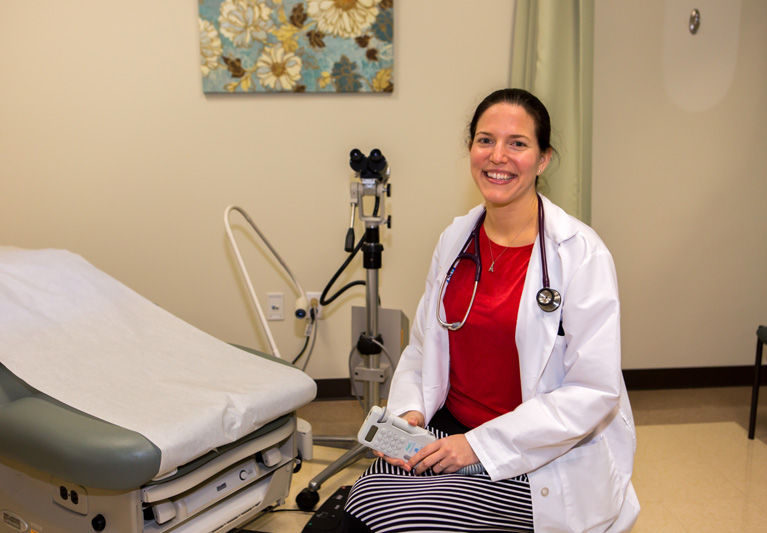
The good news about endometrial cancer is that it’s most often caught early and treated effectively; the bad news is that it’s a widespread disease that can be fatal if treatment is too long delayed.
Endometrial cancer – or uterine cancer – is now on the American Cancer Society’s “top ten” list of the most common cancers in the United States. It begins in the layer of cells that form the lining of the uterus.
The Society estimates that in 2015 nearly 55,000 new cases of this cancer will be diagnosed and that over 10,000 women will die from the disease. According to the Mayo Clinic, four out of five cases will involve women over the age of 55.
In the Vero Beach area, with its older demographic, that’s a serious problem.
Dr. Cristine DuPree of Partners in Women’s Health and the Indian River Medical Center points out that endometrial cancer is “usually taken care of by a GYN-Oncologist.”
The problem? According to DuPree, “The closest one is in Melbourne,” about 35 miles away. “If you go south,” she continues, “there’s a group in West Palm Beach,” but that’s over 75 miles away.
An obstetrician and gynecologist, DuPree earned her a medical degree from Nova Southeastern University College of Osteopathic Medicine after graduating Cum Laude with honors from the University of Florida. She had her OB/GYN training at the Philadelphia College of Osteopathic Medicine in Pennsylvania but is not a GYN-Oncology specialist.
“I’m hoping,” the effervescent DuPree continues, “with the new [Scully-Welsh] cancer center coming, maybe we can get someone here: even if they just come in once or twice a month to operate.”
“Operate” is the key word.
Surgery to remove the uterus is the most frequently recommended form of treatment for almost all women with endometrial cancer. Called a hysterectomy, the procedure may also include the removal of both the fallopian tubes and ovaries.
“If we diagnosis it early,” explains DuPree, “and it has less than 50 percent of the uterine wall from the inside to the outside affected, then surgery alone is the only treatment needed for the most common type of endometrial cancer.”
If the cancer has spread further, lymph node dissection, radiation treatment and/or chemotherapy may be required.
Endometrial cancer comes in stages. In stage one, cancer is found only in the uterus. In stage two, cancer is present in both the uterus and cervix. Stage three means cancer has spread beyond the uterus, possibly to the lymph nodes, and in stage four, the cancer has spread past the pelvic region and may affect any and all other parts of the body.
Most cases, explains DuPree, are caught in stage one. That’s in no small part because of the symptoms.
Those symptoms include vaginal bleeding or discharges not related to a woman’s menstrual cycle, general pelvic pain and/or pain during intercourse. DuPree warns than women experiencing those symptoms should consult their primary care physician immediately but adds that most women already do exactly that. “No woman likes to bleed,” says DuPree, “so they call their doctor right away.”
According to the University of Maryland Medical Center in Baltimore, if the cancer has not spread, 95 percent of women treated for endometrial cancer are alive after five years. If the cancer does spread that figure tumbles down to less than 25 percent.
Sadly, finances can also play a role here. DuPree points out that those women who “don’t have someone taking care of them on a regular basis may put off getting seen and treated early.”
That’s a mistake. Medicaid, the county health department and community health centers offer income-based free or low-cost services to help those women get the care they need. “If something is wrong,” warns DuPree, “Come in right away. Don’t wait six months.”
Unlike lung cancer and cigarettes, doctors simply don’t know what causes endometrial cancer.
Even the esteemed Mayo Clinic is vague as to what triggers this disease. It says all that’s known is that, “something occurs to create a genetic mutation within cells in the endometrium [or] the lining of the uterus.”
That mutation turns normal, healthy cells into abnormal cells that can then form tumors that can metastasize and spread throughout the entire body.
The American Cancer Society says the chances of a woman being diagnosed with endometrial cancer during her lifetime are fairly high. About one in every 37 women will get the diagnosis. That said, there are also over 600,000 women in this country who are survivors of this disease.
Currently there are no effective screening tests for endometrial cancer, so doctors say it is of the utmost importance to consult a healthcare provider at the first sign of any of the symptoms listed above.
Dr. Cristina DuPree is with Partners in Women’s Health at 1050 37th Place, Suites 101 and 102 in Vero Beach. The phone number is 772-770-6116.



